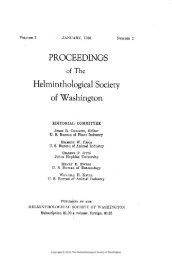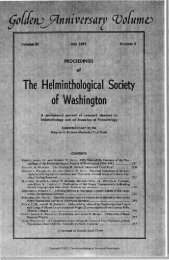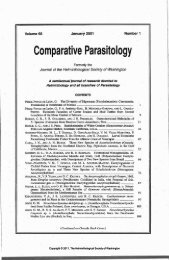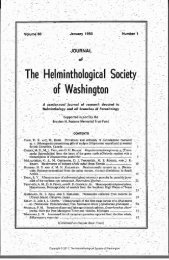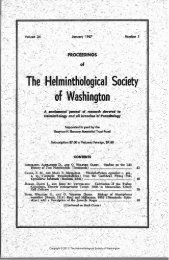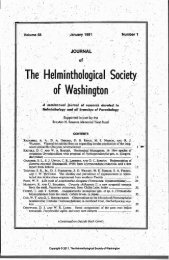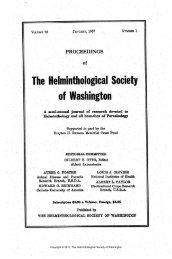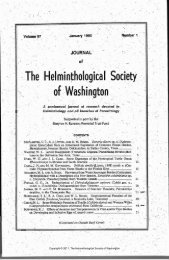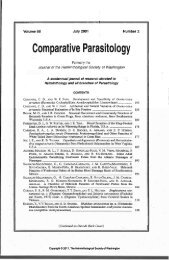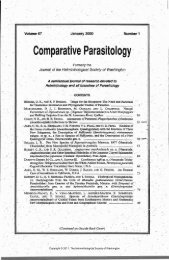Comparative Parasitology 67(2) 2000 - Peru State College
Comparative Parasitology 67(2) 2000 - Peru State College
Comparative Parasitology 67(2) 2000 - Peru State College
You also want an ePaper? Increase the reach of your titles
YUMPU automatically turns print PDFs into web optimized ePapers that Google loves.
Comp. Parasitol.<br />
<strong>67</strong>(2), <strong>2000</strong> pp. 261-263<br />
Anniversary Award<br />
The Helminthological Society of Washington<br />
FRANK W. DOUVRES<br />
J. Ralph Lichtenfels, right, presents the 1999 Anniversary Award to Frank W. Douvres<br />
Mr. President, Members and Guests, Ladies and Gentlemen, as Chair of the Awards Committee,<br />
I am honored to be able to present, on behalf of the Helminthological Society of Washington, the<br />
1999 Anniversary Award to an outstanding scientist, the world authority on the in vitro cultivation<br />
of nematode parasites of livestock and a friend and mentor to many in our society, Dr. Frank W.<br />
Douvres.<br />
Frank was born to immigrant parents in the Borough of Harlem in New York City, April 16,<br />
1927. He grew up there, speaking Greek at home, and received an outstanding education at Benjamin<br />
Franklin High School, where he graduated in 1943 at the age of 16, ranking third in his<br />
class, just behind his classmate Daniel Patrick Moynihan. Frank's classmates correctly predicted<br />
that Moynihan would go into politics, but they were off the mark when they predicted that Frank<br />
Douvres would become a Russian Commissar. This prediction was based on Frank's outspoken<br />
support for the Russian war effort against Germany in World War II.<br />
Frank completed 2 years of premed at Fordham University in December 1944. He transferred to<br />
the University of Maryland in January 1945, again in premed, but April 12, 1945, just before his<br />
eighteenth birthday, he enlisted in the navy as a hospital corpsman. On learning that Frank had<br />
enlisted, Germany immediately surrendered. Later, when Frank completed basic training, Japan<br />
surrendered!<br />
Frank was discharged from the Navy in 1947 and returned to the University of Maryland, where<br />
he switched his major to microbiology and received his B.S. degree in 1948, before reaching the<br />
age of 20 yr. At the University of Maryland Frank began to meet some really interesting people<br />
who called themselves parasitologists, so he decided to stay and work on a graduate degree. He<br />
was interested in ichthyology and completed his Master of Science degree at Maryland in 1951<br />
after completing a study program that included a survey of the parasites of fish.<br />
The parasitologist at Maryland was William O. Negherbon, who counted among his students<br />
Frank Tromba, T. Bonner Stewart, Conrad Yunker, Will Smith, and Les Costello. Professor Negerbon<br />
was studying rabies and he hired Frank Tromba to collect little brown bats, for which he<br />
paid $2 each. Douvres helped Tromba collect bats and along the way discovered a new stomach<br />
261<br />
Copyright © 2011, The Helminthological Society of Washington



